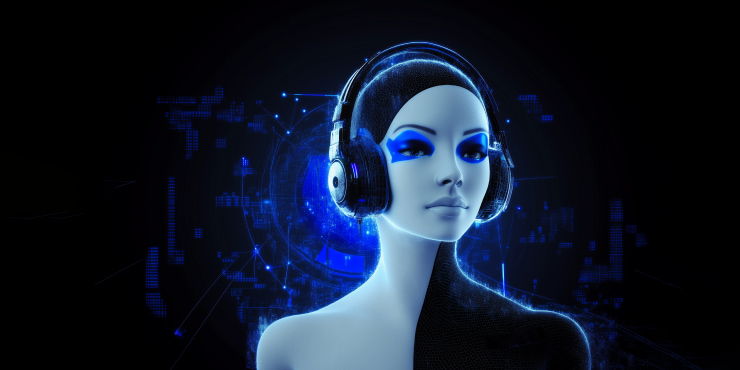AI Virtual Receptionist: Transforming Digital Reception Solutions

Ongoing technological advancement helps companies thrive in today's marketplace. Today's digital landscape is increasingly shaped by artificial intelligence and virtual receptionists. Establishing effective client communication is critical for business success. This approach relies on specialized technologies and continuous improvements. The significant advantage of a digital receptionist is 24/7 availability and constant support. It is necessary for the company not to miss a single call from customers. Initial investment in this technology can lead to significant long-term success. A virtual receptionist plays a significant role in managing calls and emails.
Creating personalized responses is crucial for success. Companies are trying to use artificial intelligence to improve interaction. Key advantages include error reduction and minimal need for human intervention. AI receptionist can focus exclusively on essential tasks, performing them efficiently. Voice chat assistants and virtual secretaries are equally important. They use natural language processing, which is an integral part of their work. The conversational interaction with the customer is similar to a human conversation. Intuitive virtual receptionist systems give companies a competitive edge. Choosing a reliable virtual receptionist is an investment in your company's growth. Improving your company's capabilities is essential for delivering quality service.
What is an AI Virtual Receptionist and How Does It Work?
A virtual receptionist helps a company manage its workload efficiently. It handles incoming calls and messages and can schedule meetings. The virtual receptionist system utilizes artificial intelligence and machine learning. The virtual receptionist also uses natural language processing for round-the-clock customer service. Here are its main functions and their characteristics:
- Call and message processing. The virtual receptionist answers incoming calls, records messages, and sends requests.
- Meeting scheduling. Depending on the appointment, the receptionist allocates calendar days for booking and rescheduling.
- Automatic questions. The virtual receptionist provides quick answers to common questions.
- Multichannel support. A significant advantage is contact with customers via phone, chat, email, and other networks.
- Call routing. The digital receptionist manages the urgency and routes calls by complexity.
Several key technological components power effective virtual receptionist systems. Using these tools helps to establish contact with the client. Here are its main characteristics:
- Artificial intelligence. AI provides automation and the ability to make decisions.
- Natural language processing. A significant advantage is understanding and interpreting the customer's context in real time.
- Machine learning. They learn and process millions of data based on past events.
- Voice recognition. The advantage is the ability of service employees to participate in human voice conversations.
- Integration with business systems. Synchronization with CRM and software is a guarantee of practical work.
Virtual reception solutions should be configured to maximize the advantages of AI. Constant availability guarantees the processing of calls and customer requests. Cost-effectiveness lies in reduced investment in employees and their training. Improved systems provide fast response times. Customer experience plays a key role in a company's brand. Scalability is essential to handle many requests simultaneously.
Key Features of an AI Virtual Receptionist
An AI-powered virtual front desk receptionist improves business operations in general. It is an integral part of customer interaction and appointment scheduling. AI-based solutions help companies to be more productive. They provide round-the-clock service, increasing customer satisfaction and performance. Here are the main functions of a virtual receptionist:
- Meeting scheduling. The virtual receptionist synchronizes with Google Calendar to manage bookings. It sends automatic reminders and reduces the number of different no-shows.
- Answering calls. The virtual receptionist handles incoming calls and records messages. It can use voice recognition to provide accurate answers.
- Generating leads. Virtual receptionist software and integration with CRM is a practical element. The analysis is used to prioritize essential customers and their calls.
These features are extremely useful in increasing the efficiency of company productivity. The workload on staff is reduced, and any mistakes are avoided. 24/7 availability allows customers to have a good experience. Customers are satisfied with instant and accurate responses. Scalable systems allow handling multiple calls simultaneously.
How AI Virtual Receptionists Streamline Business Operations
The AI virtual receptionist is very useful for business efficiency in general. Performing routine tasks and reducing human error is essential. AI receptionists handle calls, scheduling, and customer requests. Optimizing workflows is an integral part of any business. Here's how virtual receptionists save time and reduce errors:
- Virtual receptionists handle answering calls and taking messages. Their significant advantage is answering frequently asked questions in a standardized way.
- They're designed to minimize human errors in day-to-day operations. Artificial intelligence avoids misunderstandings and mistakes when performing routine tasks.
- AI voice receptionists provide real-time access 24/7, helping attract and satisfy new customers.
Virtual receptionists excel at handling real-time tasks. These tasks include answering calls and intelligent routing. Calls are filtered by importance and routed to the appropriate people. Here's what else virtual receptionists can do:
- Appointment scheduling is synchronized with calendar days to avoid no-shows. Clients can book and reschedule their appointments 24/7.
- Integration with software allows you to prioritize essential clients. Data is recorded, and customer data is kept confidential. AI can provide account details and update the payment status in real-time.
Benefits of Implementing an AI Virtual Receptionist for Your Business

Virtual office reception has many benefits for businesses. Virtual receptionists help in various operations for cost efficiency and customer experience. They are essential in scheduling appointments, phone calls, and chats. Here are a few industries and the benefits of virtual receptionists in them:
- Healthcare. A virtual receptionist schedules appointments and reminds patients of their appointments. It reduces the number of patient visits and makes the work go smoothly.
- Financial services. The virtual receptionist receives clients and checks various calls. It ensures secure data processing and controls finances.
- E-commerce. Thanks to digital receptionist software, orders are tracked. Customers get a good experience and recommendations on different products. The workload on people is reduced.
Virtual receptionists enhance operational efficiency across multiple business functions. A virtual receptionist handles many tasks simultaneously due to its scalability. They play a key role in achieving competitive advantages and business success. Here are the characteristics of its effectiveness:
- Cost-effectiveness. Reduces staffing costs, including salaries and paid time off. A significant advantage is handling a large number of calls and uninterrupted communication. Minimizing human error helps the business operate smoothly and set up.
- Customer experience. A significant advantage is the fast response time for customers. Personalized interaction helps to get an individual connection. AI receptionists provide 24/7 availability, increasing customer satisfaction.
- Scalability. It is easy to scale the growth of the business as a whole. Customers receive multichannel support, including phone and email chat. The introduction of virtual receptionists increases efficiency and reduces company costs.
Enhancing Customer Interaction with AI Receptionists
Virtual receptionists establish effective customer communication channels. Accurate, fast, and personalized assistance is provided. They provide continuous interaction 24/7 and are used in many industries. Here are the prominent examples of how artificial intelligence improves the quality of service:
- 24/7 availability. Clients receive support at any time that's convenient for them. The client receives personalized, expert assistance.
- Personalized interaction. Virtual reception solutions provide customized interactions. AI analyzes data and past customer interactions and adapts responses.
- Omnichannel support. Virtual receptionists engage customers via mail, phone, and chat.
- Language translation. A great advantage is the ability to communicate in several languages at the same time. The virtual receptionist adapts to the client's language and overcomes the language barrier.
- Timely transfer. The virtual receptionist transfers issues to human staff based on priority and complexity.
Virtual receptionists have improved customer interaction. They help with booking appointments in various fields. A good example is healthcare, where each customer receives personalized assistance. The virtual receptionist checks for availability and books the person for an upcoming appointment. Another good example of a digital receptionist is order tracking and support. The customer monitors the delivery status while the AI checks the order number. Customers can inquire about room availability and hotel availability. The virtual receptionist updates hotel data in real-time and offers it to the customer.
Reducing Operational Costs with AI Receptionists
The incredible advantage of virtual receptionists is cost reduction. Companies can optimize their staff and improve the allocation of resources. They are an excellent replacement for traditional receptionists in solving many issues. Artificial intelligence reduces investments and costs over the long term. Here is how AI services work to save companies:
- The need for multiple employees at the same time is reduced. Companies save money on their salaries, vacation, and sick leave. The system accepts a large number of calls without additional hiring.
- Digital receptionist software has excellent advantages in terms of integration with other systems. Resource allocation is optimized by automating complex tasks. AI manages various meetings, provides common answers, and ensures communication.
- Unlike traditional receptionists, artificial intelligence provides 24/7 availability for customer service without additional unnecessary costs. The practice is spreading throughout the world by reducing staff at work.
A striking example is the healthcare sector, which uses virtual receptionists. Changing from a permanent registrar to a virtual one costs an initial investment. The company saves about $50,000 per year on salaries and sick leave. They can optimize the entire work process and achieve significant operational improvements. Another example is a real estate firm using virtual receptionists to increase their potential client base.
AI Virtual Receptionist vs. Traditional Receptionists
The virtual receptionist app is handy for customers to use. The virtual receptionist provides 24/7 services and offers good communication with customers. The modern approach uses artificial intelligence and machine learning. Most companies are moving from traditional receptionists to virtual ones. Here's a comparison between virtual receptionists and traditional human receptionists:
| Virtual receptionist | Traditional receptionist |
| Advantages:Provides 24/7 services in real time. It has unlimited time due to which customers get a good experience.Handles various routes and provides multiple calls and responses.Handles thousands of requests simultaneously and tracks various patterns.An AI voice receptionist handles thousands of requests simultaneously and does not get tired.Disadvantages:Requires constant training, which lacks emotional control and intelligence.It requires a one-time investment and setup and does not require operating costs.Has trouble with complex and unique requests that require human input. | Advantages:Provides emotional and consistent interaction with customers to improve the experience.Provides empathy and builds strong relationships with customers.Provides personalized service based on the customer's condition and adapts communication.Manages multi-step requests and understands the meaning of the customer's problem.Disadvantages:Limited time and works exclusively during their working hours.Ongoing investment in salaries, rewards, bonuses, and sick leave.Handles all calls manually and requires outside help.Sends reports manually and has limited tables and statistics.Prone to human error and is subject to fatigue over time. |
Future Trends and Developments in AI Receptionist Technology

Digital reception software integrates with various systems to provide a good experience. Virtual receptionists provide personalized assistance to many customers. These intelligent and efficient systems streamline customer interactions. Here are the key advancements in virtual receptionist technology:
- There has been an improvement in voice, speech, and human emotion recognition.
- Artificial intelligence analyzes past customer experiences and offers them benefits based on their experience.
- The virtual receptionist anticipates customer needs and offers proactive solutions.
- Future models will detect emotions in voice and text for a constructive response.
- Artificial intelligence will be able to screen potential customers for preference.
- The AI virtual receptionist undergoes deep learning and provides realistic voice synthesis.
With the continuous development of artificial intelligence, machine learning is making progress. Virtual receptionists are becoming autonomous assistants. They can handle complex requests and answer a multitude of calls. They offer a seamless, 24/7 experience for customers.
How to Implement AI Virtual Receptionist Solutions in Your Business
Implementing a digital receptionist is the best solution and investment for many companies. Integrating a virtual secretary optimizes customer interaction. It will improve efficiency and save money for the company. It is essential to assess your business needs and identify your key areas. Choose the right artificial intelligence for scaling in the future. Configure artificial intelligence according to your company. Use voice interpretation and chatbots. The smooth transfer from a virtual agent to a live representative is crucial. Always test and optimize your work before starting it.The AI receptionist requires choosing the proper setup for the future. You can smoothly transition and mix systems. Implement AI solutions for ongoing analysis and routine task management. It can analyze in real-time and provide constructive answers. Live staff will help process customers according to their mood. A live person will provide the necessary emotional support and assistance. Training staff will help them understand artificial intelligence and its work. Continuously monitor system performance and efficiency to strengthen your brand and company's future.


